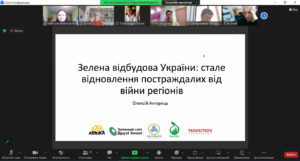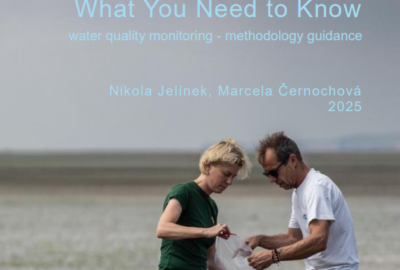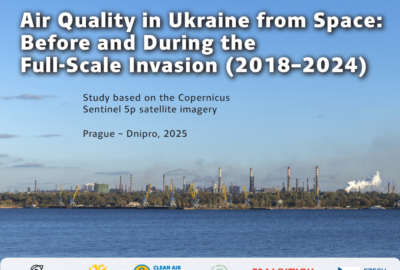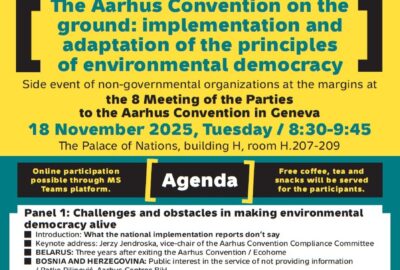The international program «Clean Air for Ukraine» gathered representatives of Kharkiv communities for the official presentation of a new project, «Green Reconstruction of Ukraine: Sustainable Recovery of War-Affected Regions».
The main goal of the project is to assess the environmental threats in the communities affected by the war, help them to develop sustainable reconstruction plans, and implement pilot technical assistance projects using green technologies and environmentally friendly solutions.

Marcela Cernochova, coordinator of the «Clean Air for Ukraine» program and representative of the NGO «Arnika» (Czech Republic), greeted everyone from Prague and emphasized the importance of forming a green recovery strategy for the country:
«The main goal of the project is to support the sustainable recovery of war-affected regions in Ukraine. We will focus on Zaporizhzhia, Dnipropetrovsk, Kharkiv, Kherson, and Donetsk regions. We want to map environmental threats in these regions, provide suggestions for the remediation of the threats, and assist local and regional authorities in the preparation of the post-war recovery process. Our ecologists will continue to study areas where hostilities occurred and regions that suffered from them».
Undoubtedly, military and security issues remain a priority. However, victory is a necessary precondition for reconstruction itself.
«We understand that in some communities, the issue of reconstruction is not on the agenda today. However, in many areas, preparation can and should take place now to enable immediate green reconstruction as soon as circumstances allow. Our main goal is to help you at this stage of the recovery process and provide a list of environmental risks locally—by districts. Our team will help assess the environmental damage caused by the war, as well as pollution and burdens related to the past», — added MarcelaCernochova.
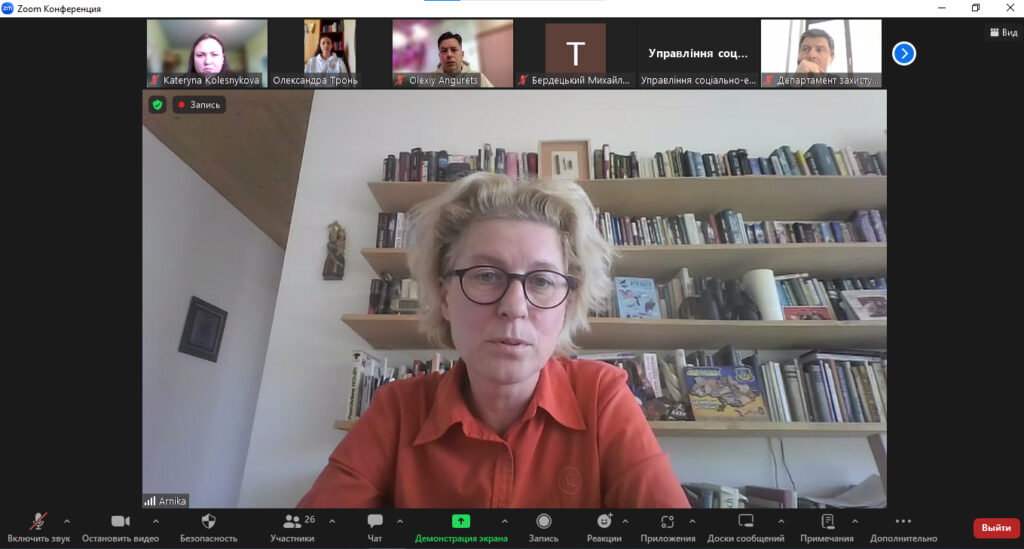
Olexiy Angurets, an expert in ecology and sustainable development from the «Clean Air for Ukraine» program, explained the project’s tasks, how the Clean Air team would assist communities, and the project’s prospects.
«It is essential to understand the real state of our ecosystems, conduct comprehensive research, and gather evidence of environmental crimes. Moreover, environmental problems often pose a significant threat to human health. It is important to have a complete picture of the situation to develop a good strategy for recovery and by involving leading experts from around the world we can bring the know-how and experience from other countries. The current situation is also an opportunity to build post-war Ukraine on ecological principles», — said the expert.

Planned Activities During Project Implementation:
– Collecting data on existing critical needs and significant environmental risks of the selected communities.
– Conducting detailed studies of contaminated sites (sampling and analysis of sediments, soil, and/or water, health risk assessment, and developing recommendations and action plans for cleaning and restoring the area).
– Assisting with the preparation of development and restoration plans for community areas.
– Implementing 2-3 pilot technical assistance projects using green technologies and environmentally friendly solutions.
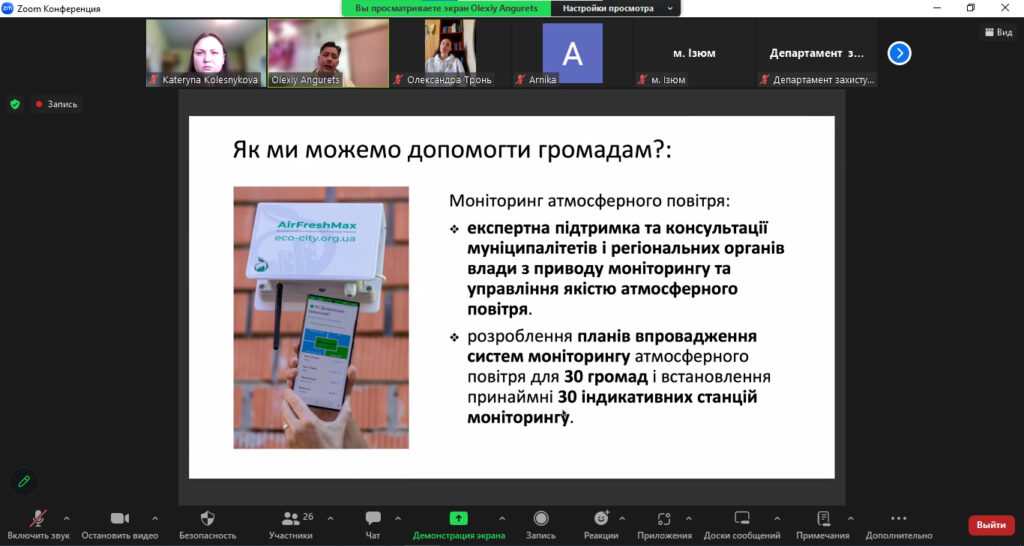
Alexey Angurets emphasized the importance of working locally, in each community separately, because the environmental problems and burdens may vary in each of them. Therefore, subsequent strategies and steps for green reconstruction may differ significantly from one community to another.
However, according to Marcela Cernochova, there is something that unites all communities:
«The results of the risk and threat assessment can be used by local authorities to prepare claims for compensation for damages and to receive systematic international financial assistance. The reports we will make for you will be developed in cooperation with independent international experts. Therefore, they can serve as a solid foundation during negotiations for international funding to restore your communities, particularly using clean solutions».
Dmytro Topchiy, Deputy Head of the Department of Land, Water Resources, Subsoil, Air Protection, Control, and Coordination of Environmental Protection Measures at the Department of Environmental Protection and Natural Resources of the Kharkiv Regional Military Administration, emphasized the importance of involving the international community and donors in the green reconstruction of the Kharkiv region, which suffers from shelling every day.
«In the fall of 2023, we already began our cooperation with the «Clean Air for Ukraine» program. We signed a Memorandum, under which Kharkiv has already received three air monitoring stations. We hope to eventually create an air monitoring network in the Kharkiv region. Currently, there is indeed a need to assess the impact of the war on the environment and the health of people in our region. Therefore, the Kharkiv Regional Military Administration’s Department of Environment will assist in the implementation of your new project», — said Dmytro Topchiy.
Thanks to the support of the Department of Environment, over 20 representatives from the communities of the Kharkiv region attended the presentation.

At the end of the event, Ekaterina Kolesnikova, a specialist from the Clean Air for Ukraine project, presented a questionnaire for local self-government bodies. This is the first stage of the “Green Reconstruction of Ukraine: Sustainable Recovery of War-Affected Regions” project. This questionnaire will help collect data on critical needs and significant environmental risks they already face. Later, it will be used in developing effective strategies for the recovery and support of communities after the war.
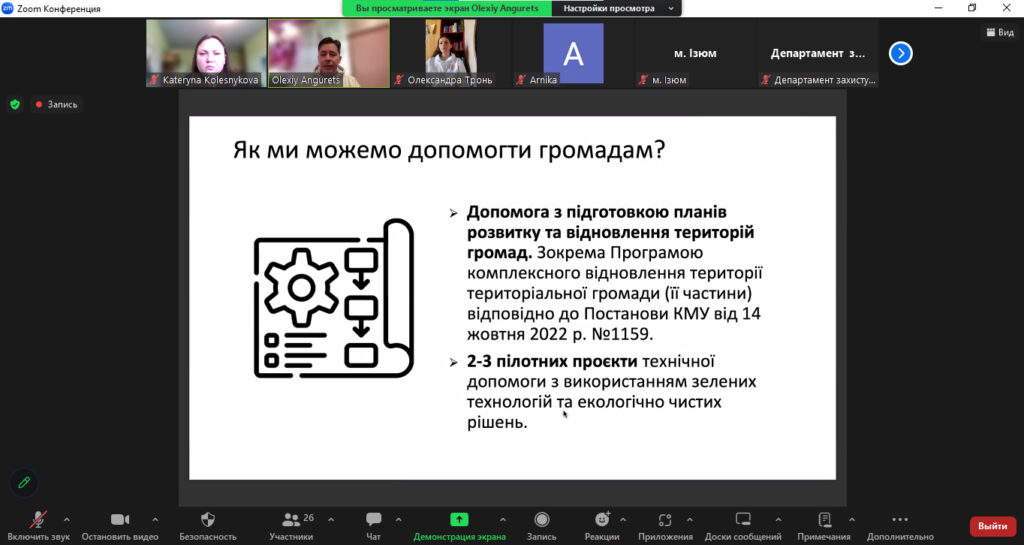
2024.04.30 Зелена відбудова України
The new project «Green Reconstruction of Ukraine: Sustainable Recovery of War-Affected Regions» plans to involve 90 communities across Ukraine and will provide expert assistance and further support to 30 communities. With the help of Ukrainian and international experts, local development plans and strategies will be created to address specific environmental problems of particular communities. At the same time, 3 communities will receive mini-grants to implement projects using environmentally friendly solutions. As part of the project, representatives from six Ukrainian municipalities will visit the Czech Republic for a 10-day trip to learn from the Czech experience in successfully implementing sustainable development projects.




